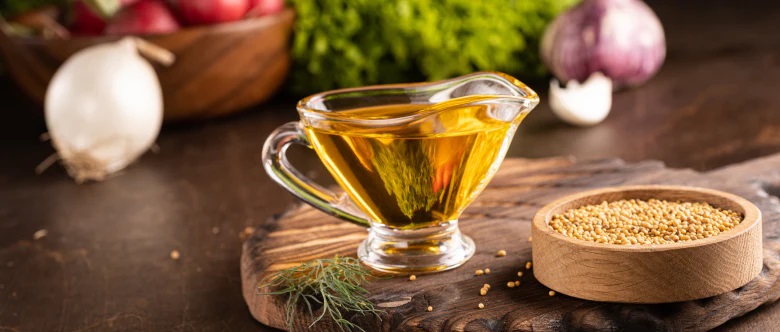Understanding Mustard Oil: Difference Between Cold Pressed and Refined Mustard Oil

Mustard oil, derived from the seeds of the mustard plant, is a staple in Indian kitchens, celebrated not only for its distinctive flavor but also for its numerous health benefits. Whether you’re drizzling it over salads, using it for sautéing, or incorporating it into traditional dishes, mustard oil adds a unique taste and richness to your meals. However, with the increasing availability of both cold-pressed and refined mustard oils in the market, it’s essential to understand the differences between the two and their respective benefits. In this blog, we’ll explore the characteristics of cold-pressed and refined mustard oils, their health advantages, and how to incorporate them into delicious Indian recipes using Puress Cold Pressed Mustard Oil, available at Pluugin Store.
Difference Between Cold Pressed and Refined Mustard Oil
When choosing mustard oil, it’s crucial to understand the production processes behind cold-pressed and refined varieties, as they significantly impact the oil’s nutritional value, flavor, and health benefits.
- Cold Pressed Mustard Oil: Cold-pressed mustard oil is extracted through a mechanical process where mustard seeds are crushed at room temperature, without the use of heat or chemicals. This traditional method helps retain the oil’s natural nutrients, flavor, and aroma. Cold-pressed mustard oil is rich in essential fatty acids, antioxidants, and vitamins, making it a healthier option. The flavor of cold-pressed oil is robust, slightly pungent, and nutty, which enhances the taste of dishes, especially in traditional Indian cooking.
- Refined Mustard Oil: Refined mustard oil, on the other hand, undergoes several processes, including heating, bleaching, and deodorizing, to neutralize the oil’s strong flavor and remove impurities. While this makes the oil more suitable for high-heat cooking and gives it a lighter color and milder taste, the refining process strips away many of the oil’s natural nutrients and antioxidants. Refined mustard oil is often preferred for frying due to its high smoke point, but it lacks the health benefits that cold-pressed mustard oil offers.
Benefits of Mustard Oil
Mustard oil, particularly the cold-pressed variety like Puress Cold Pressed Mustard Oil, is packed with numerous health benefits that make it a valuable addition to your diet.
1. Heart-Healthy: Mustard oil is rich in monounsaturated and polyunsaturated fatty acids, which are beneficial for heart health. These healthy fats help reduce bad cholesterol levels (LDL) and increase good cholesterol (HDL) in the body, thereby lowering the risk of heart disease. Additionally, the presence of omega-3 and omega-6 fatty acids in mustard oil supports cardiovascular health by reducing inflammation and improving blood circulation.
2. Anti-Inflammatory: Mustard oil contains compounds like allyl isothiocyanate and omega-3 fatty acids, which have potent anti-inflammatory properties. These compounds help reduce inflammation in the body, which can alleviate symptoms of conditions like arthritis, asthma, and other inflammatory disorders. Regular use of mustard oil in your diet or as a massage oil can provide relief from joint pain and muscle soreness.
3. Skin and Hair Care: Mustard oil is a time-tested remedy for maintaining healthy skin and hair. Its high content of vitamin E, an antioxidant, helps protect the skin from free radical damage, preventing premature aging, wrinkles, and fine lines. When applied to the skin, mustard oil acts as a natural moisturizer, keeping it soft and hydrated. For hair, mustard oil promotes healthy growth, prevents dandruff, and reduces hair fall due to its nourishing and strengthening properties. A regular scalp massage with mustard oil can improve blood circulation, promoting thicker and healthier hair.
4. Antimicrobial Properties: The antimicrobial properties of mustard oil make it effective in fighting off harmful bacteria, fungi, and viruses. Traditionally, mustard oil has been used as a natural remedy for cold, cough, and respiratory infections. It is also used as a preservative in pickles due to its ability to inhibit the growth of microorganisms.
Indian Recipes Using Mustard Oil
Incorporating mustard oil into Indian cuisine not only enhances the flavor of the dishes but also adds nutritional value. Here are two popular Indian recipes that highlight the use of mustard oil, perfect for those looking to enjoy the authentic taste of India.
1. Sarson Ka Saag (Mustard Greens Curry)
Ingredients:
- 500g mustard greens (sarson)
- 250g spinach (palak)
- 100g bathua leaves (Chenopodium album)
- 2 tablespoons Puress Cold Pressed Mustard Oil
- 2 medium onions, finely chopped
- 2 tomatoes, chopped
- 4-5 green chilies, chopped
- 1 tablespoon ginger-garlic paste
- 1 tablespoon maize flour (makki ka atta)
- 1 teaspoon red chili powder
- Salt to taste
- Butter or ghee (optional)
Instructions:
1. Wash and chop the mustard greens, spinach, and bathua leaves. Boil them together in a large pot with a little water until they are soft and tender. Drain the water and blend the greens into a coarse paste using a hand blender or mixer.
2. Heat Puress Cold Pressed Mustard Oil in a pan. Add chopped onions and sauté until golden brown. Add the ginger-garlic paste and cook until the raw smell disappears.
3. Add chopped tomatoes and green chilies, and cook until the tomatoes turn soft and mushy.
4. Stir in the maize flour and cook for a few minutes to remove the raw taste. Add the blended greens paste, red chili powder, and salt. Mix well and cook on low heat for 10-15 minutes, stirring occasionally.
5. Finish with a dollop of butter or ghee if desired. Serve hot with makki ki roti (cornbread) and enjoy the rich, earthy flavors of this classic Punjabi dish.
2. Aloo Methi (Potato and Fenugreek Curry)
Ingredients:
- 3 medium potatoes, peeled and cubed
- 2 cups fresh fenugreek leaves (methi), washed and chopped
- 2 tablespoons Puress Cold Pressed Mustard Oil
- 1 teaspoon cumin seeds
- 1 teaspoon mustard seeds
- 2-3 green chilies, chopped
- 1 tablespoon ginger-garlic paste
- 1 teaspoon turmeric powder
- 1 teaspoon coriander powder
- 1 teaspoon red chili powder
- Salt to taste
Instructions:
1. Heat Puress Cold Pressed Mustard Oil in a pan. Add cumin seeds and mustard seeds, and let them crackle.
2. Add chopped green chilies and ginger-garlic paste, and sauté for a minute until fragrant.
3. Add the cubed potatoes and stir well to coat them with the spices. Add turmeric powder, coriander powder, red chili powder, and salt. Mix thoroughly and cook the potatoes on medium heat until they are half-cooked.
4. Add the chopped fenugreek leaves and mix well. Cover the pan and cook on low heat until the potatoes are fully cooked and the fenugreek leaves are tender.
5. Serve hot with roti or paratha, and enjoy the slightly bitter yet delightful taste of methi combined with the pungent flavor of mustard oil.
Conclusion
Mustard oil, especially the cold-pressed variety like Puress Cold Pressed Mustard Oil, is a versatile and healthful ingredient that can elevate the flavor and nutritional value of your meals. By understanding the differences between cold-pressed and refined mustard oils and incorporating them into your cooking, you can enjoy the numerous health benefits this traditional oil offers. Whether you’re looking to improve heart health, enhance your skincare routine, or simply savor the authentic taste of Indian cuisine, mustard oil is a must-have in your kitchen. To experience the richness of Puress Cold Pressed Mustard Oil, visit the Pluugin Store and start your culinary journey today.








